Interview with Andrea Auten
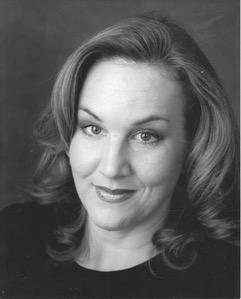 In this magical season of glitter and gifts, of wrapping paper, cards, and mad rushes to find that “perfect” present, there is a place for quiet gratitude. Along with the bare trees, bright stars, and snow-covered lawns—in all the madness, there is peace and appreciation. Appreciation of what we have, a desire to remember others and to give to those who may be experiencing harder times.
In this magical season of glitter and gifts, of wrapping paper, cards, and mad rushes to find that “perfect” present, there is a place for quiet gratitude. Along with the bare trees, bright stars, and snow-covered lawns—in all the madness, there is peace and appreciation. Appreciation of what we have, a desire to remember others and to give to those who may be experiencing harder times.
Even though we are living in a time of particular division and strife, I do believe that more and more of us are looking for ways to connect with others. To look up from our phones and make eye contact with the person across from us on the train—or the homeless person on the street. To smile at the cashier ringing up our groceries (or if you’re the cashier ringing up the groceries, to smile at the customer at the register).
We are hungry for ways to acknowledge our common humanity. We are all in this human experience together, after all.
And then there are those whose “job” it is to give. First responders, health care providers and, the oft forgotten (and too often disparaged) teachers among us.
I think we can all remember a teacher who saw in us what we had not yet seen ourselves, who lifted us with a kind gesture or simple words of encouragement.
Andrea Auten is a wonderful teacher, both in her professional life and by example. While she no longer stands in front of a classroom of children, she continues to be a champion of self-expression—especially in the arts. Andrea is always looking for pathways to guide others on their journeys in whatever way she can, to be a person of comfort for those who have experienced trauma or who are just having a hard day. Please take a few minutes to read her gorgeous, powerful piece “The Takers,” published first in Lunch Ticket and and recently reprinted in Lady/Liberty/Lit and visit her online at andreaauten.com.
I had the pleasure of speaking with Andrea a few months ago on FaceTime. I hope you enjoy our conversation.
Diane: Hi. How are you, Andrea?
Andrea: I’m doing really well. Thank you.
Diane: Good! Let’s jump in then! I wanted to interview you because you do so many interesting, inspiring things in the world, and I think WomanPause readers would really enjoy learning about you. I’m going to leave it to you to share with us what you do, and then I’ll ask you questions. How’s that?
Andrea: That’s great. Thank you. I am probably most involved in the educational world as a writer. I have found this wonderful niche working for the university as a writing specialist. I help people with their academic papers, reflection papers, the MFA critical paper, and sometimes people’s MFA annotations. When I’m working with people in the office space or online, all those other aspects come true. I use the years of experience in education and the background that I have in the arts.
“One of the Struggles of Being an Interdisciplinary Artist is That All Through My Life I Was Pushed Mostly by the Educational World to Pick One Area of Concentration”
There seem, Diane, to be these connections all the time. Somebody writes something and because I’m a visual artist suddenly my knowledge base helps them. Or someone else will be writing something and I’ll say, “Oh, have you ever seen the musical such and such?” Or, “Here’s a really great play.” Because I’ve had a stage career both as an actor and as a director.
If someone says they’re dealing with trauma, I will be able to be supportive and the fact that I’m… I don’t like to use the word “survivor,” I really like “overcomer” … but because I have shared a similar hard past, there’s some spark where we connect.
One of the struggles of being an interdisciplinary artist is that all through my life I was pushed mostly by the educational world to pick one area of concentration. It’s really only recently that we are able to find places to express it all. I have other writer friends who are artists or who are artist/singers or artist/theater people. Amy Shimshon Santo, whom I’ve interviewed, is actually a trailblazer out here in California for combining writing and the arts. I’m starting to see an increase in venue for it, education for it, but at the time where I was up and coming, “You have to pick one.”
“I’ve Never Really Understood Why I Went That Direction. It Actually Could Have Been Fear”
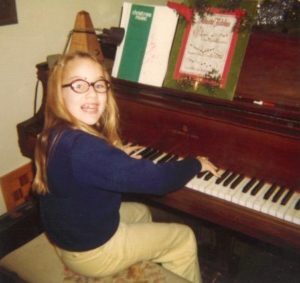 Diane: Which one did you pick originally?
Diane: Which one did you pick originally?
Andrea: It shocked everyone to be honest with you. I was on the performer path, but I picked visual art.
Diane: I didn’t know that you were an actor and director. Tell us about that.
Andrea: Yeah, and a playwright.
Diane: And a playwright. Look at you, Rockstar!
Andrea: Growing up, I was in Dayton Ballet Company classes, modern and ballet. I actually have a very difficult knee disease that started to show itself when I was about maybe 12, 13. That took me out of that. But, meanwhile, I was singing. I started singing in front of people when I was four. I’m from a singing family. My father was a highly regarded, maestro conductor and opera singer. Our world was the arts. My mother was singer, an arts PR director, and had been a journalist.
So, I’m singing as a little girl and then I’m on the stage and I was a very animated, bombastic child, who just loved being up in front of people. I love giving talks and presentations. I think a lot of teachers do. In high school I was in all the musicals, all the plays, I was even directing some. I was doing the costumes, painting the sets. I mean, I was just a thespian all the way. I was also taking art classes and the art classes I think… I’ve never really understood why I went that direction. It actually could have been fear.
I Watched Other People and It Was Like They Would Go Without Food So They Could Create Art. Like, ‘Mm. Really?’”
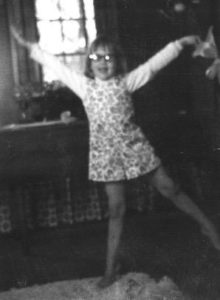 Diane: Fear of what?
Diane: Fear of what?
Andrea: Fear of being a performer. And I don’t think my parents were supportive of it. I’m very bad at math, so I have trouble sight singing and reading music. But art also calmed me, and I liked that feeling. It really wasn’t until I went to the university and studied art that I recognized I was not a full time, full-focused, zero anything else, visual artist. I watched other people and it was like they would go without food so that they could create art. Like, “Mm. Really?”
I kept feeling this pull towards some other things I loved. On top of that—and I love this—my classmates had a lot of trouble interpreting our art faculty’s directions. Our art faculty were not trained to be teachers. They were professional artists teaching classes. There was such a disconnect, and I had the voice in my head of my father who was a music professor. My classmates would say, “What did they just tell us? What do they want us to do?”
And then I would quietly interpret to them what the lesson was, what was expected. And that’s when I started to go, “Oh, huh. I didn’t know that about me.” I eventually dropped out of art school, came back home with my head in my hands crying to my dad, “I don’t know what I want to do. I don’t know what I want to be. I have all these interests.” And I guess he’d been holding back forever but he said, “Have you ever thought about taking a couple teaching classes?” I took a couple education classes at his university and it was like my mind was blown, Diane. It was a language I understood. It was like being with my people. That’s the best way I can describe it.
Diane: So, what kind of teacher were you? What did you teach?
Andrea: Certified K through 12, visual art. I could also teach practical arts which meant if we had industrial art or fabrics or a little bit beyond visual art. Not so much the graphic art. A lot of those jobs didn’t exist for high schools. It was very hard to get a job because they were cutting arts programs at the time.
“I Felt That Dragon Inside Still Gripping My Voice and Holding Me Back”
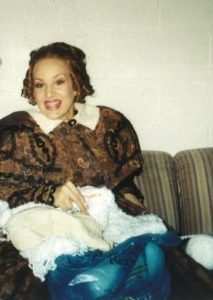
Yearly Gig at Cincinnati’s Playhouse in the Park_ A Christmas Carol
Diane: So what other things did you do?
Andrea: While my children were small, I opted to be a stay at home mom and would substitute teach. The things I loved in high school sort of came back. I had moved to the town where I grew up. I had a lot of contacts in the arts in Dayton, Ohio. And I was making costumes, designing them for all the high school productions, I was painting sets for all kinds of productions. I was kind of feeling the need to be on the stage again. That bug never went away, and so I slowly started working in excellent community theater with good professionals because, to be honest with you, I could tell when something was good. I had been exposed to some of the best opera, the best performers. Oh the stories, you can’t even imagine, what I was exposed to with my parents.
I started to get some professional work. When I started working down in Cincinnati, I started to feel that fear again. I thought, “Well maybe I need to be educated.” So I put myself back in school, into a really competitive program, kind of like American Idol. I’m back in school for four years, my children are small. They’re school age but they’re small.
Diane: A lot of extra work.
Andrea: Right, but it was also thrilling. Then we moved to California. I felt that dragon inside still gripping my voice and holding me back, so I kind of walked away from theatre for a while. I owned a children’s theater company up in Camarillo, California. And so, I directed some children’s theater.
But then we moved back to Yellow Springs right outside of Dayton. I got a dream job teaching high school and middle school art. I ran their theater program. They have a very strong one because Yellow Springs is an artist colony. And so I was with my people. I was in a great village, I had a job I loved, and I was directing.
“Those Kids Hadn’t Had Any Arts and It Was So Exciting to Be a Bridge to Help Them Get to Their Own Creative Voices Visually”
But my husband was still out here in California. And I just missed him so bad. After three years, I was like, “This is like one of us lives in Ireland and one of us lives in the United States.” You know what I mean? So, we came back to LA, and I got an amazing job working specifically with middle schoolers in art where they hadn’t had art classes since the first grade. A highly impacted community in an area that has about 23 different gang affiliations and hard, hard working families in a hard place to live. It was so exciting to be a bridge to help them get to their own creative voices visually. It was thrilling—and exhausting.
Diane: I’m sure. I know when you teach in a high needs district, you sometimes have many more issues to work through before you can even get to the education. Art may be a little bit different because it’s so expressive, but I can imagine how exhausting that would be, carrying a lot of burdens.
“I Always Made the Art Room a Room of Hope.”
Andrea: Right. And the class sizes were huge. When they go up to 40 teaching art, I’d say to my husband, “My god, I only have two hands for 80 other hands.”
Diane: And 40 middle schoolers, oh my god.
Andrea: Packed into the same room. But just as I described how I found art calms me, it would calm them. They’re very hard-working students. They were just underexposed to the arts. So everything is fresh and new and exciting. They just hadn’t seen yet what’s available to them. That’s the way I looked at it, so I always made the art room a room of hope. I did that for about five years and then went back to get my master’s. I have two masters. I don’t know if you know that.
Diane: No.
Andrea: We were struggling to hold onto our house in Yellow Springs. I was back there, and I was helping my mother who had had a knee replacement and I just walked into Antioch Midwest and said, “I’ve always wanted to have my master’s. And I’ve been writing all my life. And I feel like I want to find the place where I can codify and combine and bring my arts into writing.” And they said, “Come on in.”
Diane: That’s wonderful.
Andrea: So I got a master of arts from Antioch of Midwest’s now defunct low residency program. They shut the program down right near the end of my degree. And then I got a hold of Steve Heller, (Steve was the director of the Antioch LA MFA program at the time) and I said, “I just don’t feel fully educated yet.” And I mean, think about it, it was a master of arts, it wasn’t a master of fine arts. It didn’t have the same rigor. It was a good program. I wrote my manuscript: this 327-page manuscript and graduated from Midwest and then within a couple weeks started at Los Angeles.
“Our Mission Is to Give Voice to the Classically or Historically Under-represented and Marginalized, to Have Conversations About Social Justice Themes”
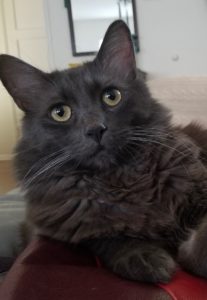 Diane: Wow. So, I know you’ve been really involved in Lunch Ticket. Can you talk a little bit about the mission, how that speaks to you, and the project that you work on with the Youth Initiative?
Diane: Wow. So, I know you’ve been really involved in Lunch Ticket. Can you talk a little bit about the mission, how that speaks to you, and the project that you work on with the Youth Initiative?
Andrea: Yes. I would love to do that. I can see my cat is distressed though, I’m just going to—
Diane: Oh, let your cat in.
Andrea: Yeah, this is Dusky. Dusky is my son’s cat. He speaks two languages.
Diane: Meow and what else?
Andrea: English and Spanish.
Diane: How old are your kids, by the way, Andrea?
Andrea: They’re grown.
Diane: Okay.
Andrea: And I have my husband’s son who lives in Dayton but he’s older. He’s kind of like my little brother. And then he’s got kids. So, I have grandkids.
Diane: Woohoo. Do you mind if I ask your age, my dear?
Andrea: Oh, no, don’t ask me. I have four little grandsons.
Diane: Oh, you got out of that one.
Andrea: (Laughing) Brian’s got two kids and then their mama remarried and there are two more They live right up the road, so we get to see them a lot, too. Did you notice it’s all boys? I have sons, four grandsons, a nephew out here, more nephews back in Ohio. Only a few nieces.
Diane: Wow, what are we going to do about that? We have to talk to somebody, right?
Andrea: Yes! Okay. Lunch Ticket is the social justice journal for our university. It’s student run, and we are conscripted to seek out, read, and do vetting for writers, with emphasis on marginalized, under-represented writers, emerging, established or even those quite well known. And our mission is to give voice to the classically or historically under-represented and marginalized, to have conversations about social justice themes in writing or in visual arts. I have the pleasure and the honor of being a lead for the visual art team. It’s been very exciting to have a hand in how the publication looks.
“I Had to Be an Extremely Humble Learner and I Had to Learn from Making Mistakes”
And then the most taxing, yet very, very fulfilling job I was involved with was MARCOMM: marketing and communications. Marketing is our branding, our outreach; it’s all that emailing and online sharing to grow the journal, to grow the presence. The social media is the communications. I pressed hard to bring our social media up to current standards. I’ve had to teach myself everything. And then I had to ask everybody everything. I had to be an extremely humble learner and learn from my mistakes, a great way to learn.
I love to direct, plus there’s fulfillment in anonymity when pursuing social justice. That’s where the service-spirit can do the most, I believe. I’m behind the scenes and I’m saying, “Look at this wonderful stage. Look at these wonderful people saying all that they want and need to say.” We drove the outreach in directions where our team could get more followers and engagement. I’m very, very proud of what we accomplished. We worked very hard. It’s seven days a week. There’s no day off whether it’s a holiday or not. There’s immediacy, like working in the news.
And it’s a beautiful way, also, to increase my network of people for myself as a writer and then do that for other writers. It’s been so fulfilling and working in the writing center—the Teaching and Learning Center—it’s the same thing. I feel like all of these disparate areas of my interest are congealing.
“We Want to Be Boots on the Ground, Go and Work in Classrooms, All That. But We Could Start with a Portal”
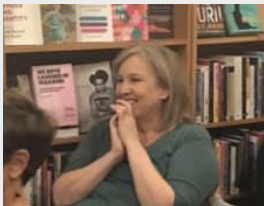 Diane: What about the Youth Initiative?
Diane: What about the Youth Initiative?
Andrea: When you first started with Lunch Ticket, you’re asked what your interests are. I said if there’s anything about children writing, high schoolers especially, I’m in. And there really wasn’t anything. We would have meetings where we’d pick up where past team members had tried to begin some version of a youth representation. We were just throwing out ideas and wishes and reasons why it couldn’t work: legality, how was it going to take shape, etc. And each time I would go back the next term and say, “I’m still interested in getting this off the ground. What do we need?” And I would push a little bit and there would be a little bit of pushback from the university staff because like I said, legality was a big one.
Eventually I had the opportunity to talk to one of the university’s lawyers. And I just said, “What do I need? Tell me what I need to know with the legality.” So, she did. And what was exciting about it was, call it serendipity, I don’t know, but I just happen to have the California cleared credential and experience needed and was able then to work with Kori (Wood) Kessler. (Kori was the Editor in Chief at the time.) Kori was the fulcrum who made the thing finally happen. She and I would talk and say, “Well, we could start small.” There’s been this larger idea—we want to be boots on the ground, go and work in classrooms, all that. But we could start with a portal. And that portal is for young people who range between the ages of 13 and 17. I have a small team who evaluates their work. Now that Kori has graduated and moved on, I work with the new EIC, Amanda Lopez. But, ultimately I am the only person who interacts with the youths, and I interact very little and very formally.
So, the hope is that we’re scooping in younger writers.
“I Think That the Trauma in Childhood First Kept Me from My Dreams”
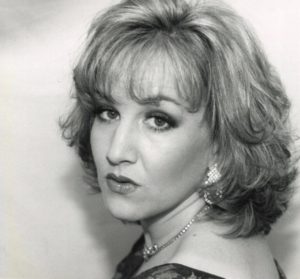
Head shot from the Theater Days
Diane: That’s amazing. So, I have a few more questions before I let you go. You had mentioned trauma in your background. You don’t have to get into any details if you prefer not to. But how has trauma informed your path?
Andrea: Oh, what a beautiful question. I think that the trauma in childhood first kept me from my dreams. And then, and very recently, boiled them down to the heart and made me say, “If I can’t make something out of my life, the person who took all of my freedom and the child and the life that I thought I was going to live, it means that person wins.” And so, I’ve worked hard recently to not be afraid.
At Lunch Ticket I began to speak out and people said, “Yep, me too.” But if you would look at my artwork growing up, look at my writing and the expression in my stage work, I think that everyone saw it. “Oh, this is what gives her this passion and pathos.” I’ve been told that I can write the melancholic very well, sorrow, without being maudlin, that it’s authentic. And then I think, what did trauma do for me as a person? — which you can’t really pull apart from being an artist—is this: if I’m not exceptionally kind, I’m not happy with myself. I’m very strong. I think so are you, Diane. I am empathetic, compassionate, and nothing is more important to me than the protection of a child. So, I think that’s really what paves the path.
“My Dad Respected My Mother … He Taught Me How I Should Expect to Be Treated”
Diane: So this blog is for everybody who wants to read it. But it’s generally targeted to women over 50. And I—
Andrea: Yeah, I am.
Diane: Okay. That’s enough for me. And I, personally, and people that I’ve spoken to in that bracket, see the 50s as this wonderfully freeing space. How did that manifest in your life?
Andrea: I absolutely agree. I almost feel like I can walk through the world with anonymity somehow. I can be completely erased, and I get to think and act and do more of what I want. Also, I do respect that we’re living in a different time. We’re living in a time of such liberation. I have a difficult relationship with my mother, but there are things about my mother that are so valuable to me. One of them is that she had a lot of power in our home even though my father was a powerful but very loving man. Especially if you’ve read my stuff, you know that I have great respect for my dad. But my dad respected my mother and my mother had a voice, and he taught me how I should expect to be treated.
I think everything I ever wanted for myself and the obstacles that were in the way whether they were self-made, or they were a result of trauma or they were the reality that we’ve been up against as women, now those feel like they’re set free. Yeah, definitely.
“I Was the Holder of Secrets. Now, I’m Letting Them Out Because I’m Not Afraid. What Do I Lose by Exposing My Truth?
Diane: So when you said erase, most people would hear that and say, “Who wants to be erased?” But what do you mean? People’s eyes aren’t all on you or?
Andrea: People’s eyes aren’t all on me. I think that’s a great way to describe it. Also I think I feel left alone. I think I’m seeing differently. I don’t feel like I’m considered a threat. I’m treated with respect. I’m also a bigger person, tall. I’m a broad shouldered, big-backed woman, and I think that society responds in a certain way to people of size. But, I just feel like I’m… I want to be careful thinking about that because I’ve always gotten respect like in the classroom I always got respect, I always got respect from younger people, always. But not really my peers. That’s always been a bit of a struggle and so that feels different now. I feel like I’m getting peer respect now.
I was the holder of secrets. Now, I’m letting them out because I’m not afraid. What do I lose by exposing my truth? That’s the most liberating of all. I don’t know if that’s because I’ve come into my zone or if it is indeed feeling different for women or it’s what you’re saying, the age of the 50s is liberating. But I feel like what you’re talking about is utterly real.
Diane: Isn’t it, though? It’s amazing, right?
Andrea: How do you—
Diane: How do I see it? It’s like I don’t give a fuck. That’s how I see it now. It’s like, “Whatever.” And part of it is also that I’ve lived through enough to know that if something’s going to sting or be an obstacle, life goes on and there’s another side. And I don’t take things or myself as seriously. But, that frees me to take the important things more seriously. Like the little stuff just falls away.
“I Just Won’t Let Whatever’s Been Against Me Win. I Just Won’t Give Up”
Andrea: Beautifully said because all the trauma and the events of life—and we’ve had very hard ones—it either crumbles you or it gives you the wall to stand against. I feel like we really go one way or the other. And for whatever reason, I’m just lacing up those boots and I just soldier on. Part of it’s my culture, part of it’s from being from southern Ohio, part of it is that expectation. But then I also just think a big part of it is I just won’t let whatever’s been against me win. I just won’t give up.
Diane: I get that. Totally.
Andrea: I really don’t know how to give up.
Diane: That’s a good thing.
Andrea: Right.
Diane: What about your writing? What’s going on with that?
Andrea: Oh, fantastic. Well I just got back from this Maine Media Workshop, and I studied again with Sarah Van Arsdale. Creative nonfiction is still what comes to me the most easily. I feel like more and more like I’m building a creative nonfiction collection.
I’m in a writing group called DWG—the Degenerate Writers’ Group. André Hardy, Steven Desjarlais, and Matt Green. They’re my readers and then I have a handful of other people who I highly respect also who read my drafts. The DWG meets once a month online. We have a spreadsheet where we write how many words or pages or what we’re in the middle… we do that daily. I need to do that. And then we get together and have our own residency, two times a year.
Diane: That’s really wonderful.
Andrea: They’re good writers and good men. I like a reader to be really sharp. I don’t need critiques told to me softly, I don’t need any icing. Just get to the heart of it and tell me.
“I Never Feel Regret That I Waited to Be a Published Writer as an Older Person Because, for Me, It’s Been the Gathering of Experience; It Gives Me the Material”
Diane: That’s also, I think, what happens when you’re over 50. Cut the bullshit, I can take it, I’m not going to die, right? I want to hear it.
Andrea: Right. Well and there was something I heard last week on the internet week about a piece and this woman wrote… it was a #MeToo piece of fiction. But she was being treated really inappropriately. It reminded me. There was one time where I sang alone on the stage, a big dramatic moment in the piece and I sang this big, difficult piece in the role I was playing. I received a standing ovation. It was powerful, and I just did it, Diane, I just went there and nailed it. When I got off the stage, one of the guys who was on the cast said, “You’ve got a really nice rack.” And all I could do was utter, “Um…Thank you.” There wasn’t even a, “Fuck off.” First of all, I was very shocked. So, I’m not in that zone anymore.
Diane: Yes, we can give that up at 50, right?
Andrea: Yeah.
Diane: So, do you have anything you think we missed that you want to share?
Andrea: I’m really working hard on goals, like deadline goals that I’ve created for myself. I’m also planning to try to do more travel as much as can work with my family since I’m managing two member’s difficult health issues there. My writing and literary work keep me invested. I read for CRAFT magazine, and I’m still on Lunch Ticket. I’ll be teaching a training on presentation at the university, and I’m developing a class I’ll be teaching.
Recently, I became the Communications and Outreach Manager for The Nasiona, a nonfiction storytelling organization. We amplify the marginalized, undervalued, overlooked, silenced, and forgotten through a variety of services. The Nasiona’s experienced and dynamic leadership team are busy developing our magazine, a publishing house, a podcast, editing services, and an internship program, all of which help us delve into the human condition and reach more people.
The writing is an everyday habit. I am thrilled… I never feel regret that I waited to be a published writer as an older person because, for me, it’s been the gathering of experience, it gives me the material. And, I don’t feel regret because I’m in such a prime time of writing for women. I feel privileged and honored to call myself a member of the writing community and I hope that my literary citizenship toward fellow writers is always giving and extending a platform, as best I can.
Diane: And you do.
Andrea: Oh, thank you.
Diane: So, I help kids with college essays and one of the questions all the guidance counselors ask them is what three words would your friends, teachers, family, use to describe you?
Andrea: Kind, driven, loving.
Diane: I’d throw in generous. You are, you have a very generous heart, you really do.
Andrea: And I also consider myself just exceptionally, extremely right-brained. So, I’m very, very much an artist.
Diane: And you have a kitty going in your bag.
Andrea: I’m so glad you can see him. He’s kind of naughty because he’s only two. And he’s very smart.
Diane: Okay. We’ll forgive him. All right, so this has been wonderful. It’s been great fun to see you again.
Andrea: You too. Let’s stay in touch.
Diane: I would love that.
As always, I’d love to hear your thoughts. Please leave a comment or send me an email!
Stay warm and see you December 20!
Diane



Diane! I love your interview questions, you brought to light a few of my dear friend’s gifts. One of these is obviously eloquence.
Thank you for what you are both doing and saying about life and particularly, about the life of women passed 50. It’s a ferocious time that has been mistaken for a time when we are supposed to become quieter and of less importance.
Mmmmmwwwwaaaaah 💕❤️💕
Thank you, Carmen! Love ferocity, especially in women over 50!!
Speaking of eloquence! Great words, Carmen! Thank you for reading the interview, my dear, dear friend. Over the long haul, you have helped me loose the chains.
Andrea Auten puts the boom boom into my heart (WHAM reference). She is fantastic. She is always inspiring me.
Also, I’d like to personally assert that kitty Dusky goes a little crazy when I speak Spanish to him. He’s a good “kiri” (or kitty in English).
Thank you, Mireya, for adding some music to your response … and for thinking to include Andrea’s bilingualDusky.
Thank you, Mireya. You inspire me the same! You are pure sunshine. With your loaded schedule, it means much to me that you can take time to read this interview. Dusky loves Mireya.
Thank you for reading the interview, Janet. In such a busy time as the Antioch residency it means so much that you took the time. Agreed about Diane’s blog. It’s great. 🙂
A fun, delightful interview with our renaissance woman, Andrea!! Thank you for your beautiful blog, Diane! Always worth my time!! Blessings, Janet
Thank you, Janet! Love “renaissance woman!” Great description!
Definitely, Jessica O’Dwyer. All the time wasted pleasing, dodging, fearing…it can halt us or we can say, ‘Get behind me’ while we rush forward toward goals. So nice of you to read this. Best to you as you shine on! Thanks for reading the interview!
Great interview.
Andrea’s passion and voice comes through so clearly. I love the way you both discuss the evolution of self-image: Andrea’s story of delivering a long-ago, kick-ass singing performance only to be symbolically slapped down by a man in the wings nails it. That was then and this is now.
Your life and essence are inspiring.
Onward and Brava!
“That was then and this is now.” Love that, Jessica. How true and how wonderful to share the growth with each other.
As another Antioch LA alum I was thrilled that you’ve interviewed Andrea :))
It was wonderful to learn more about the richness of her experiences, the challenges she has overcome. Of course I already knew that she’s kind & loving, & I agree with you, Diane, that’s she’s very generous. She’s warm & caring- the first to reach out when someone needs help.
At my first residency, I was feeling wobbly, & questioning the wisdom of starting the MFA program, & Amy Shimshon Santo sat outside with me to hear about my doubts. I’ll never forget her kindness either.
We are surrounded by smart, resilient, courageous women. Thank you, Diane, for reminding us regularly.
Sarita, thanks for reading. You are indeed strong, wise, talented, and full of zesty humor. Diane is a kind and giving literary partner, offering us time and attention. When women gather, we can create forum for change. I’m grateful for you and our literary teammates. Strong womyn, all.
Thank you, Sarita! Love the strength and wisdom we all gain from the “smart, resilient, courageous” women around us.(Let’s not forget funny!)